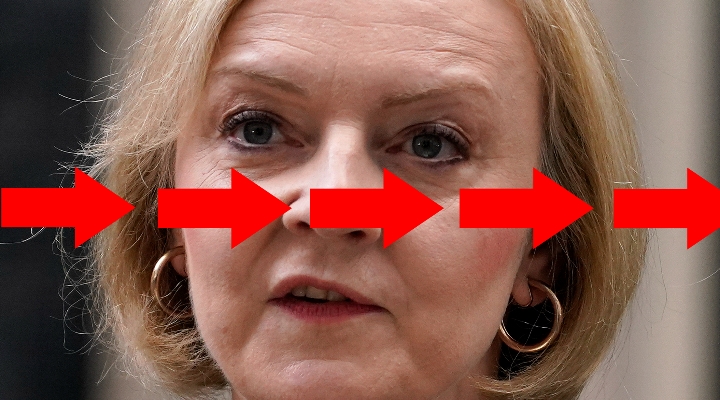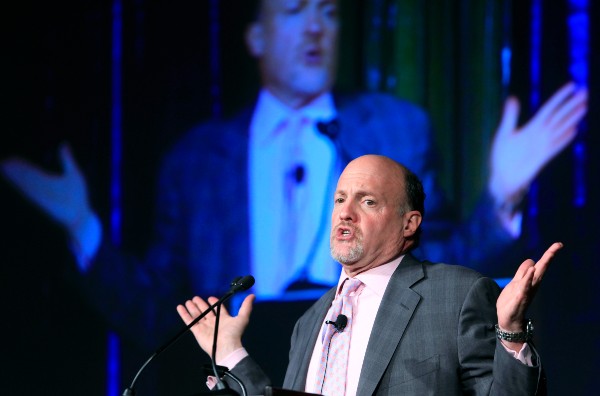
Fast-Forward Politics is Here to Stay
"A week is a long time in politics" has always been a cliché trotted out when Whitehall events take a turn for the dramatic. But even that seems an inadequate description of the week that was. On Friday morning last week Kwasi Kwarteng was still (just) chancellor. Only on Monday did his replacement, Jeremy Hunt, stand up in parliament and rip up almost every big proposals in the mini-Budget.
By Thursday, it was clear to those closest to Truss that the game was up. If she was a candidate on a reality TV show, there would barely be enough footage for the best bits montage. Fittingly enough, she didn’t even outlast the new Channel 4 reality TV show Make Me Prime Minister, in which willing members of the public are put through their paces in political challenges.
Read all our coverage of the political implosion here
Hargreaves is Worth Keeping an Eye on
From one organisation losing a leader and miring itself in internal arguments to another, Chris Hill, chief executive of Hargreaves Lansdown since 2017, this week announced he will leave the business next year. The timing around his departure has drawn ire from co-founder Peter Hargreaves, who has also been highly critical of the group’s chairwoman Deanna Oppenheimer for overseeing what he described as the group’s “diabolical”. Shares in the company have more than halved since Oppenheimer became chair in early 2018, and plunged again on news that Hill will leave before seeing through his five-year turnaround plan for the company. At the heart of it all: the still-unresolved Woodford Scandal, which will be remembered for years after Liz Truss has hung up her comic sans-adorned growth-growth-growth placard.
The CMA is Taking the Gif
UK competition authorities appear to be getting tough with US tech giants. The Competition and Markets Authority (CMA) has issued a final order that Meta – owner of Facebook, WhatsApp and Instagram – must sell Giphy, a company producing animated gifs for social media networks. The CMA said Meta’s acquisition of Giphy would harm competition for consumers using social media, as well as advertisers. This latest ruling effectively means the end of the road for Meta’s appeal process, and suggests the CMA is taking a tougher approach to regulating big tech in the UK, with a particular focus on ensuring smaller challengers aren’t squeezed out of this market. It does beg the question though: why wasn’t Zuckerberg stopped from buying the business in the first place?
Amazon Faces UK Legal Action Too
Amazon faces legal action in the UK that it is abusing its dominant position and favours its own products over cheaper options from third-party sellers. The complaint centres on the “featured offers” in its "Buy Box", and the contents of said box are almost always goods it sells itself – as opposed to those flogged by third-party retailers, who pay hefty storage and delivery fees to their Bezos overlord. The action is being brought by Julie Hunter, a consumer rights campaigner who is also a member of the Financial Services Consumer Panel. Hunt claims Amazon’s “secretive and self-favouring algorithms” prevent consumers making informed decisions about other products. She is seeking damages of around £900m, which could be shared with Amazon customers.
Gravity-Free Fizz is One Small Sip For Mankind
Champagne house GH Mumm has developed a bottle of bubbly suitable for space flights, while also meeting the tough standards of the champagne appellation. The high-tech bottle will allow those in zero gravity to drink from traditional open coupe glasses, although the drinking experience may be a little different. Drinkers will first have to first catch small spheres of champagne as they float in the gravity-free atmosphere. NASA currently bans alcohol in space, but the company is hoping the drink will be enjoyed by space tourists of the kind championed by rocket men Jeff Bezos and Elon Musk. One potential snag though: NASA also bans carbonated drinks from space, as bubbles do not rise upwards in zero gravity. That can affect the way they are digested. In a delicate explanation, GH Mumm explains that, rather than being belched out as on Earth, this can cause other, er, “adverse side-effects”.
HSBC is in Hot Water Over ESG
The Advertising Standards Authority has banned a series of HSBC adverts saying they made "misleading" claims about the bank’s environmental credentials. The ads highlighted how HSBC was funding tree-planting initiatives and other climate-friendly initiatives, but omitted to mention it also funds fossil fuel products, which are contributing to the carbon emissions driving the climate crisis. The ASA said future marketing communications should contain this “material information”. It is clear that the regulator is getting tough on policing company’s “green” claims after making a similar ruling against Persil recently. Barclays and Standard Chartered bank may be in its sights next.
Pensioners May (*May*) Get a Bumper Pay Rise
Nobody knows what will happen next, so this one comes with a big pinch of salt. That said, inflation figures published this week suggest the state pension should be uprated by a record 10.1% in April, under the terms of the so-called “triple lock” — the biggest rise ever. At the start of the week, new chancellor Jeremy Hunt seemed reluctant to commit to an inflation-linked increase while he was trying to balance the books, but on Wednesday Liz Truss gleefully told parliament the government was keeping the policy. We could still see an in-effect triple u-turn on the triple lock yet though. Your guess is as good as ours.
The US is Heading For a Recession
It isn’t just the UK economy that’s struggling. The boss of Goldman Sachs has warned there is a "good chance" the US will slide into recession too. David Solomon, Goldman’s chairman, chief executive and house DJ, said the investment bank was braced for market turbulence as the world’s largest economy slows. The comments come as the banking giant announced an overhaul of its structure after seeing its profits almost halve over the past three months. In particular, it’s been hit by falling revenues in its investment banking division, amid a sharp slowing of merger and acquisitions activity worldwide.
Starlink Won’t be Disrupted
Controversial billionaire Elon Musk is never far from the headlines. But rather than dwelling on the Tesla boss’s legal wranglings over whether he is, isn’t, maybe, possibly, one day, buying Twitter, this week people were asking whether he would keep the internet running Ukraine. Musk initially said he would cease funding the satellite-based Starlink internet service, which is provided by SpaceX. The Pentagon subsequently stepped in to suggest it could foot the bill before Musk did a u-turn of his own and committed to the service (at a cost of around £18m a month). While that will provide crucial communications infrastructure to a country under siege, most Ukrainians will probably take a dim view of Musk’s previous suggestion that Ukraine could cede territory to Russia – a remark that was met with an unpublishable response by a Ukrainian diplomat on Twitter.
Jupiter Has Shrunk in The Fund Management Universe
Jupiter Fund Management continues to shrink in size, with its latest quarterly figures showing it lost £600m (net) of client business in the three months to September. This means it has seen net client outlaws for the last seven quarters equating to £8 billion over this period. Fewer investors and falling markets mean Jupiter has seen its assets under management drop by a huge £13bn to £47.4 billion in the last two years. Fortunes have certainly changed for the fund management house, founded by John Duffield in the 1980s. Its share price has fallen from 631p at the start of 2018 to just 98p today. Like many other active fund managers it has faced increased competition from lower-cost exchange-traded products and index-tracking providers, and has struggled particularly in the retail market with poor fund performance.








.jpg)


:quality(80)/cloudfront-us-east-1.images.arcpublishing.com/morningstar/6BCTH5O2DVGYHBA4UDPCFNXA7M.png)
.jpg)
















